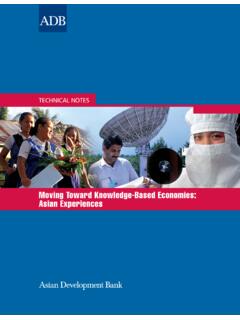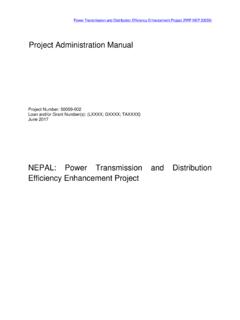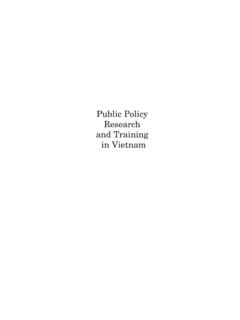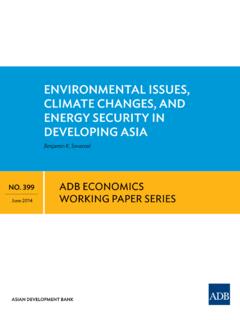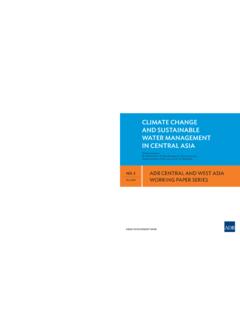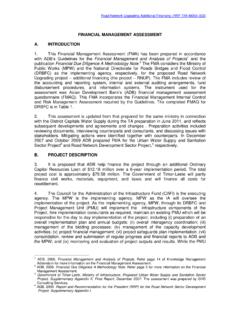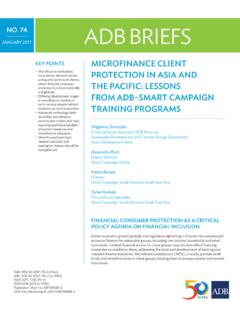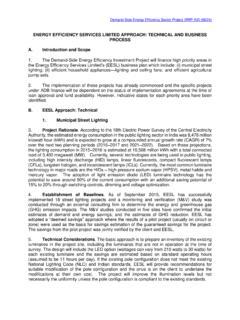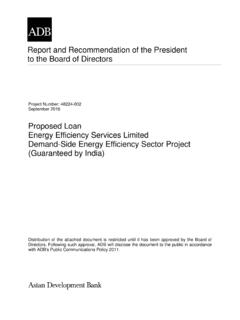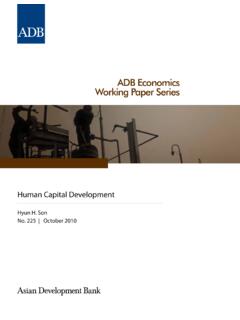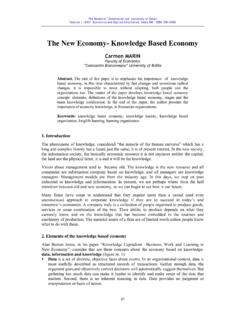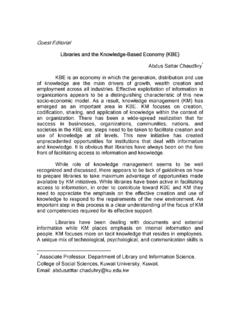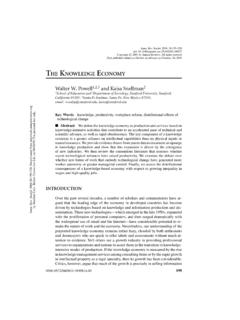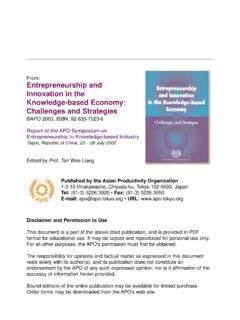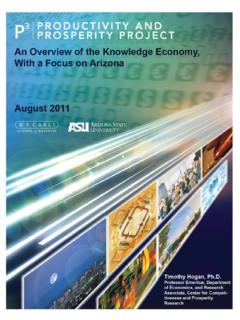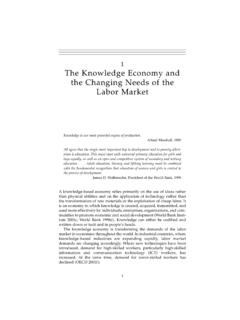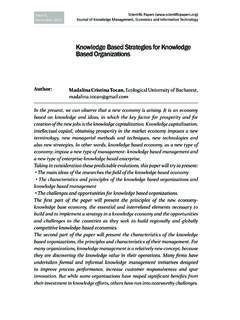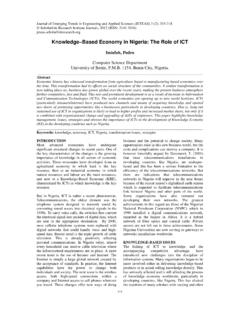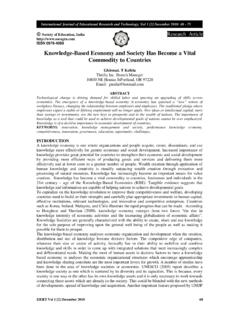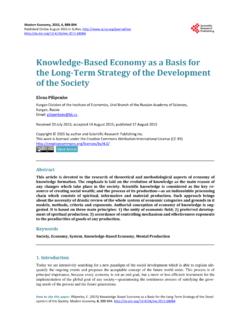Transcription of Innovative Asia: Advancing the Knowledge-Based Economy ...
1 Innovative asia Advancing THE knowledge ! based ECONOMYASIAN DEVELOPMENT BANKINNOVATIVE asia Advancing THE Knowledge-Based Economy highlights OF THE FORTHCOMING ADB STUDY REPORTASIAN DEVELOPMENT BANK 2014 Asian Development BankAll rights reserved. Published in 2014. Printed in the Philippines. ISBN 978-92-9254-506-2 (Print), 978-92-9254-507-9 (PDF)Publication Stock No. RPT146434-3 Cataloging-In-Publication DataAsian Development Bank. Innovative asia : Advancing the Knowledge-Based Economy highlights of the forthcoming ADB study City, Philippines: Asian Development Bank, knowledge Economy .
2 2. asia . 3. Economic growth. I. Asian Development views expressed in this publication are those of the authors and do not necessarily reflect the views and policies of the Asian Development Bank (ADB) or its Board of Governors or the governments they represent. ADB does not guarantee the accuracy of the data included in this publication and accepts no responsibility for any consequence of their making any designation of or reference to a particular territory or geographic area, or by using the term country in this document, ADB does not intend to make any judgments as to the legal or other status of any territory or encourages printing or copying information exclusively for personal and noncommercial use with proper acknowledgment of ADB.
3 Users are restricted from reselling, redistributing, or creating derivative works for commercial purposes without the express, written consent of :In this publication, $ refers to US ADB Avenue, Mandaluyong City1550 Metro Manila, PhilippinesTel +63 2 632 4444 Fax +63 2 636 orders, please contact: Public Information CenterFax +63 2 636 on recycled paperContents1 Introduction 12 Learning from Advanced Economies 23 State of Play of Knowledge-Based Economies in asia and the Pacific 64 highlights of Four Country Studies 175 A Possible Road Map for the Knowledge-Based Economy in Developing asia and the Pacific 3047th ADB Annual Meeting knowledge Sharing and Partnership Events.
4 The Silk Road Connecting asia with the Changing WorldThis paper provides highlights from an Asian Development Bank (ADB) study titled asia s knowledge Economies: Next Policy Agenda. A suite of reports will be completed shortly under this study: a flagship report on Knowledge-Based economies in asia ; four country reports on the People s Republic of China, India, Indonesia, and Kazakhstan; and a report on creative productivity in asia in partnership with the Economist Intelligence Unit. The study has assessed the current state of Knowledge-Based economies in a number of developing Asian economies and has benchmarked them with advanced economies using the four pillars of innovation, information and communication technology, education and skill, and the economic and institutional regime.
5 The underlying premise is that emerging economies in asia can climb up the ladder of higher value-added products and services in global markets and go beyond middle-income levels by strengthening Knowledge-Based development processes. The study outlines policy actions required in developing member countries of ADB to advance as Knowledge-Based economies. It identifies how emerging economies can draw on game-changing technology trends and other developments to move faster toward the global knowledge paper was prepared by Shanti Jagannathan, Senior Education Specialist, Regional and Sustainable Development Department, ADB Members of the ADB team who worked on this study include Donghyun Park, Principal Economist, Economics and Research Department, ADB and Seok Yong Yoon, Senior Public Management Specialist, Regional and Sustain-able Development Department.
6 ADB Carl Dahlman, Jae Moon, Ron Perkinson, and Poh Kam Wong are the four international consultants who contributed to this policy research project. The national experts who contributed to the country studies in the People s Republic of China, India, Indonesia, and Kazakhstan are Yang Yao, Arpita Mukherjee, Hafid Abbas, and Oraz Jandosov, respectively. Carmela Fernando Villamar provided coordination and research support throughout the study. Ross O Brien provided editorial and infographic project was implemented under the overall guidance of Bindu N.
7 Lohani, Vice-President for knowledge Management and Sustainable Development, ADB; Woochong Um, Deputy Director General, Regional and Sustainable Development Department, ADB; and Bart Edes, Director, Poverty Reduction, Social Development, and Governance Division, Regional and Sustainable Development Department, ADB. To provide strategic guidance to the study, ADB had established a high-level panel, which is cochaired by Lawrence Summers, Charles W. Eliot University Professor, Kennedy School of Government, Harvard University and Kishore Mahbubani, Dean and Professor in the Practice of Public Policy, Lee Kuan Yew School of Public Policy, National University of Singapore.
8 The other members of the panel are Bindu N. Lohani, Vice-President for knowledge Management and Sustainable Development, ADB; Han Duck-soo, Chairman and Chief Executive Officer, Korea International Trade Association; Takatoshi Ito, Dean, Graduate School of Public Policy, University of Tokyo; K. Vaman Kamath, non-executive Chairman of the Board of Directors, ICICI Bank, and Infosys Technologies; Justin Yifu Lin, Honorary Dean, National School of Development, Peking University; Mari Pangestu, Minister of Tourism and Creative Economy , Indonesia; Andrew Sheng, President, Fung Global Institute.
9 And Dominic Barton, Global Managing Director, McKinsey & ADB Annual Meeting knowledge Sharing and Partnership Events: The Silk Road Connecting asia with the Changing World1 Over the last quarter of a century, driven mostly by cheap labor, developing countries in asia have seen unprecedented growth rates and contributions to the global economyThe development of Knowledge-Based economies (KBEs) is both an imperative and an opportunity for developing asia . It is an imperative to sustain high rates of growth in the future and an opportunity whereby emerging economies can draw from beneficial trending developments that may allow them to move faster to advance in global value chains and in position in world the last quarter of a century, driven mostly by cheap labor, developing countries in asia have seen unprecedented growth rates and contributions to the global Economy .
10 Sustaining asia s growth trajectory, however, requires developing economies to seek different approaches to economic growth and progress, especially if they aspire to move from the middle-income to the high-income level. KBE is an important platform that can enable them to sustain growth and even accelerate it. Much of the exemplary growth in asia has come from its economies long-held comparative advan-tage in labor-intensive goods. Emerging economies will, however, find it impossible to continue their success under the same growth models used over the last few decades, as technological progress changes the ways countries produce and trade.
